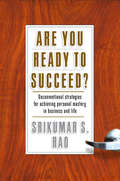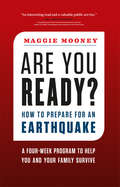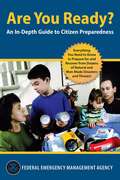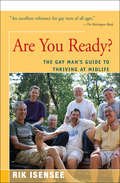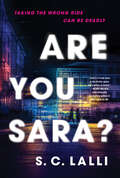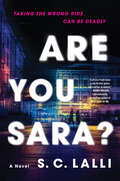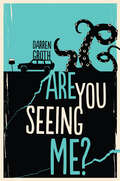- Table View
- List View
Are You Ready to Succeed?: Unconventional Strategies to Achieving Personal Mastery in Business and Life
by Srikumar S. RaoThe premise is simple: A person's ideal life, especially their career, can be carefully conceived and crafted. Based on Dr. Rao's popular course "Creativity and Personal Mastery" at Columbia University's Graduate School of Business, this book offers a series of readings, exercises, and lessons drawn from both spiritual and commercial situations that enable you to reconstruct and improve your professional world. This transformation will turn your life around and help you become exponentially more effective in your chosen career, and thereby flourish in all aspects of your life. Whether you are questioning the value of money or the core values of your life, this book is a powerful tool that will help you to "discover the purpose that can suffuse your life and bring stars to your eyes."
Are You Ready!: Take Charge, Lose Weight, Get in Shape, and Change Your Life Forever
by Bob HarperThe world-renowned fitness coach on the hit TV showThe Biggest Loserpresents his winning approach to lasting weight loss by showing how to get at the root of your overeating problem, followed by a nutritionally savvy diet and unique exercise plan. OnThe Biggest Loser, Bob Harper gives contestants the practical tools and psychological insights they need to get into the best shape of their lives. The key to his success is the emotional connection he makes with each participant, and he brings that same spirit toAre You Ready! Harper starts with a four-step strategy for getting at the root of negative thought patterns and destructive behaviors, replacing both with a clear way to build self-worth and confidence. With these tools in place, people are empowered to make real, lasting changes in their lives. In an easy-to-follow eating plan, he provides lists of foods that are nutrient-dense and naturally low in calories, more than twenty sample menus, and tips on eating on the run, in restaurants, and on vacation. His fitness plan is geared to making exercise an integral part of daily life with workouts (ranging from 20 to 60 minutes) based on training techniques that tone and strengthen, burn calories, and reshape the body. Woven throughoutAre You Ready!are true-life success stories that will keep readers engaged and motivated; bulleted tips, tools, and coping strategies; and sidebars debunking common myths about food and fitness. Whether your goal is losing ten pounds or a hundred, you will find Harper’s message inspiring and his methods a proven path to finally achieving your dream of weight loss and fitness.
Are You Ready?
by Amanda HeartyReady for... love?Ready for.... a new job?Ready to... grow up?Ready for... change?Ready for...life?Life has been good for Ali, Molly, Ben and Sarah, things have seemed easy and uncomplicated and they have had the world at their feet. But now as they say goodbye to their twenties and thirty looms they begin to question themselves... Is Ali really ready to get married and become a wife, or is everything moving too fast? Molly has followed her dreams and changed jobs, but has she made a big mistake? Ben is still living at home - surely it's time he moved out? And will Sarah ever find someone to love or will she always be single?Life is full of twists and turns and change is inevitable. Now they must ask themselves... are they ready for it?
Are You Ready?
by Maggie MooneyAs earthquakes have struck around the world with alarming frequency, millions have realized they are unprepared for similar catastrophes close to home. Online disaster plans and older books-heavy with seismic science and a survivalist focus-leave the average reader overwhelmed with details and anxiety. How much water will I need? What if I'm driving? How do I protect my six-year-old? The questions go on-and in this book Maggie Mooney answers them. Her four-week readiness program includes straightforward instructions, forms, and checklists. Mooney explains what to expect during a quake, and what to do when the shaking stops. She also addresses both aftershocks and tsunamis.Use this guide and the checklists inside to get ready:Find your safe spots at home, at work, at school, and outdoors.Develop your emergency communication plan.Shake-proof your home.Assemble emergency supplies. By following the steps in the four-week readiness program described here you can avoid injury and ensure you have the food, water and other essentials you need to be prepared rather than scared.
Are You Ready?: An In-Depth Guide to Disaster Preparedness
by Federal Emergency Management Agency US Department of Homeland SecurityEverything You Need to Know to Prepare for and Recover from Dozens of Natural and Man-Made Disasters and Threats!Are You Ready? is an all-encompassing practical guide for individuals and their families to preparing for all types of hazards and emergencies. It can be used as a reference or a step-by-step guide to developing, practicing, and maintaining emergency plans. It provides information, checklists, educational materials, and graphics to help you effectively plan for before, during, and after any kind of disaster. Topics covered include: • Creating a disaster supplies kit • Dealing with natural hazards such as floods, earthquakes, and tornadoes • Responding to technological hazards such as hazardous materials incidents and nuclear or chemical emergencies • General information about terrorism
Are You Ready?: Devotions for Advent and Christmas
by Lyle AlbrechtWho was John the Baptist?Discover who John the Baptist was and the hopeful message he preached to God’s people through these 37 short devotions for the Advent and Christmas season. Each easy-to-read devotion includes a Bible passage, a practical life application, and a short prayer.Use these devotions from December 1 through January 6 to prepare your heart for the celebration of Jesus’ birth!
Are You Ready?: The Gay Man's Guide to Thriving at Midlife
by Rik Isensee"Readers of this book should be ready to experience an engaging intimate conversation about how to live with wisdom and passion while embarked on the uncertain journey of midlife. Gay men of all ages will be enriched by Isensee's timely and eloquent synthesis of his clinical work and the firsthand accounts of ten remarkably articulate men. If you are curious about life after coming out, Are You Ready? is a landmark that will serve as a reference point in your own travels. It just may redirect your life." --Robert M. Kertzner, M.D., Associate Clinical Professor of Psychiatry, Columbia University
Are You Sara?: A Novel
by S.C. LalliTwo women, each named Sara, get into separate rideshares . . . but only one makes it home alive. Which Sara was the real target?Despite a scholarship, law student Saraswati “Sara” Bhaduri holds down two jobs in order to make her way through school, but it’s still a struggle. She’s had to do things to pay the bills that most people wouldn’t expect “a nice Indian girl” to do. Sara is working at the campus bar one seemingly ordinary Tuesday night when her boss demands that she deal with a drunk girl in the bathroom.The two women become fast friends. Why? Because they have the same name. And despite their different circumstances, they connect. At the end of the evening, each orders a rideshare home. They tumble into the back of their respective cars and head out into the night.But sometime later, Sara wakes up in the car to find she’s on the wrong side of town—the rich side—and realizes that she and Sarah Ellis took the wrong cars home. With no money, Sara walks back to her apartment on the shady side of town only to see police lights flashing, illuminating a body crumpled on her doorstep: Sarah. But was the target Sarah Ellis or Sara Bhaduri? And why would anyone want either of them dead? In this smart, twisty novel about wealth, ambition and dangerous longing, the layers are peeled back on two young women desperate to break away from the expectations placed on them, leading to devastating results.
Are You Sara?: A Novel
by S.C. Lalli"Dynamic women with complicated lives take center stage in this twisty mystery about a rideshare mix-up which results in murder. Lalli is a fresh voice in the thriller genre and a writer to watch!" —Wendy Walker, internationally bestselling author of Don't Look For MeTwo women named Sara each get into a rideshare. . . but only one makes it home alive. Which Sara was the real target?Law student Saraswati “Sara” Bhaduri holds down two jobs in order to make her way through school, but it’s still a struggle. She’s had to do things to pay the bills that most people wouldn’t expect from “a nice Indian girl.” It seems like an ordinary busy Tuesday night at the local dive bar until her boss demands Sara deal with a drunk girl in the bathroom.The two become fast friends. Why? Because they both have the same name. And despite their different circumstances, the two connect. When they both order rideshares home, they tumble in the back of the cars and head out into the night.But when Sara awakes in her rideshare, she finds she's on the wrong side of town—the rich side—and she realizes: she and Sarah took the wrong cars home.With no money, Sara walks back to her apartment on the shady side of town only to discover police lights flashing and a body crumpled on her doorstep: Sarah.Was Sarah Ellis or Sara Bhaduri the target? And why would anyone want either of them dead?In this smart, twisty novel about ambition, wealth, and dangerous longing, the layers are peeled back on two young women desperate to break out of the expectations placed on them, with devastating results.
Are You Scared Yet?
by Hunter MorganSome Sins Cant Be Forgiven The police label them "victims," but she only sees them as depraved sinners. With each death, she rids the world of another monster. . . but not before offering them a chance to repent, atoning with their agony for the evil they committed. . . Some Wrongs Cant Be Forgotten Delilah Swift is on a career and personal high--recently promoted to detective in Stephen Kill, Delaware, and becoming involved with the chief of police, Snowden Calloway. But happiness turns to dread when bodies surface in a local pond--all dead long before they reached the water. Delilah knows the hallmarks of serial murders, and each gruesome discovery points to a twisted psychopath growing bolder and more brutal. . . Some Crimes Deserve No Mercy In this town full of secrets, a cold-blooded killer is acting as judge and executioner. Anonymous notes--harmless at first, then increasingly sinister--appear in Delilahs mailbox. But the closer Delilah gets to the truth, the higher the stakes. Because Delilah has a secret of her own. . . and it could be the death of her. . .
Are You Scared Yet?: Romance Psychological Suspense
by Hunter Morgan"ARE YOU SCARED YET? is a must-read for readers who love romantic-suspense police-procedurals with the accent on the investigation." ~A Passionate Reader-- Delaware. 2011 --Some Sins Can't be Forgiven . . .The police call them victims, but she only sees them as depraved sinners. With each death, she rids the world of another monster--but not before offering them a chance to atone with their agony for the evil they committed.Some Wrongs Can't Be Forgotten . . .Delilah Swift is on a career and personal high . . . recently promoted to detective in Stephen Kill, Delaware, and becoming involved with the chief of police, Snowden Calloway. But happiness turns to horror when bodies surface in a local pond--all dead before they reached the water. Delilah knows the hallmarks of a serial killer, and each gruesome discovery points to a twisted psychopath growing bolder and more brutal.Some Crimes Deserve NO Mercy . . .In this town filled with secrets, a cold-blooded killer is acting as judge and executioner. Anonymous notes--harmless at first, then increasingly sinister--appear in Delilah’s mailbox. But the closer Delilah gets to the truth, the higher the stakes. Because Delilah has a secret of her own . . . and it could be the death of her.From The Publisher: Hunter Morgan creates chilling suspense with romantic elements in small town settings. Fans of Melinda Leigh, Loreth Anne White, Skye Jordan as well as Mary Burton will enjoy this and other Hunter Morgan romantic psychological suspense stories.Other Titles By Hunter Morgan:She'll Never TellShe'll Never LiveShe'll Never KnowDon't Turn AroundAre You Scared YetWhat She Can't SeeUnspoken Fear
Are You Seeing Me?
by Darren GrothTwins Justine and Perry have left their home in Australia and embarked on the road trip of a lifetime in the Pacific Northwest. <P><P> It's been a year since their dad lost his battle with cancer and Justine became the sole caregiver for her autistic brother, Perry. Now Perry has been accepted into an assisted-living residence in their hometown, Brisbane, Australia, but before he takes up residence, they're seeking to create the perfect memory. <P><P> For Perry, the trip is a glorious celebration of some of his favorite things: Ogopogo, Jackie Chan movies and earthquakes. For Justine, it's an opportunity to learn how to let go--of Perry, of her boyfriend, Marc--and to offer their mother the chance to atone for past wrongs. <P><P> But the instability that has shaped their lives will not subside, and the seismic event that Perry forewarned threatens to reduce their worlds to rubble...
Are You Serious?
by Lee SiegelA provocative critique of modern frivolity and a guide to being serious in an unserious age We used to live in a world run by serious people: politicians and religious leaders, writers and artists, journalists and academics, lawyers and business executives, who approached their work with maturity and mindfulness. Today it seems as if most of these figures have all but disappeared, leaving our country and our culture in the hands of amateurs, buffoons, and professional clowns. Yet, according to Lee Siegel, seriousness has been elusive in every age, and every age has its own particular obstacles to living seriously. In a unique combination of fiction, memoir, history, social criticism, satire, and spiritual reflection, Siegel illuminates our contemporary distractions of profit, popularity, and instant pleasure as we search for ways to be serious in culture, in politics, and in everyday life. Are You Serious? is a thoughtful and enlightening exploration of seriousness in all its incarnations, from the heights of intellectual endeavor to the depths of political conflict to how the word itself is used in ordinary situations, from romance to business. Siegel lays bare the forces in modern life that create the silliness all around us, and he describes how seriousness may be attained through the qualities of attention, purpose, and continuity, in satisfying lives forged in bonds of work and love.
Are You Sh*tting Me?
by Cary McnealBlue Ice, Meteors, and Beaver Ass, Oh My! FACT: The use of maggots to clean wounds has proven to be effective for patients who don't respond to traditional treatments. FACT: The Icelandic dish hákarl is beheaded basking shark that is buried in the ground for six to 12 weeks to putrefy before it is eaten. FACT: Used during the Dutch Revolt, rat torture involved trapping rodents under a bowl on a prisoner's stomach then heating the bowl's exterior so the animals would eat through the victim's flesh to try to escape. FACT: The average person picks his nose five times every hour, occasionally eating what he picks. The world is a scary place, and it gets scarier every day. From the creator of the bestselling 1,001 Facts That Will Scare The S#*t Out Of You comes this new collection of 1,004 (count 'em!) truly horrifying and horrifyingly true facts about the world around us. From ancient medical practices to doomsday scenarios, to disgusting food from around the world and the entire terrifying state of Florida, the facts in Are You Sh*tting Me? are sure to entertain and disturb you at once. Unless of course you are already disturbed, in which case this is the book for you!
Are You Sleeping: A Novel
by Kathleen BarberSerial meets Ruth Ware’s In A Dark, Dark Wood in this inventive and twisty psychological thriller about a mega-hit podcast that reopens a murder case—and threatens to unravel the carefully constructed life of the victim’s daughter.The only thing more dangerous than a lie...is the truth. Josie Buhrman has spent the last ten years trying to escape her family’s reputation and with good reason. After her father's murder thirteen years prior, her mother ran away to join a cult and her twin sister Lanie, once Josie’s closest friend and confidant, betrayed her in an unimaginable way. Now, Josie has finally put down roots in New York, settling into domestic life with her partner Caleb, and that’s where she intends to stay. The only problem is that she has lied to Caleb about every detail of her past—starting with her last name. When investigative reporter Poppy Parnell sets off a media firestorm with a mega-hit podcast that reopens the long-closed case of Josie’s father’s murder, Josie’s world begins to unravel. Meanwhile, the unexpected death of Josie’s long-absent mother forces her to return to her Midwestern hometown where she must confront the demons from her past—and the lies on which she has staked her future.
